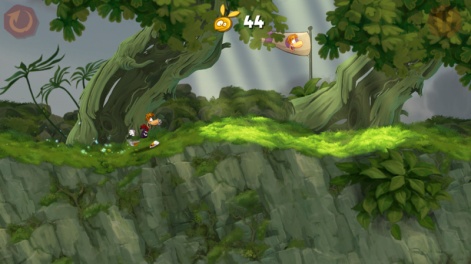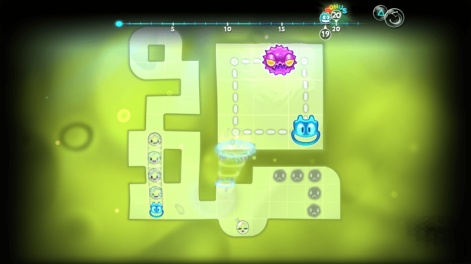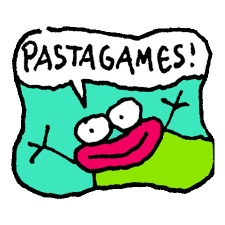Like many successful things, the Pastagames we know today emerged from the wreckage of a failed venture.
Founded by Fabien Delpiano and friends back in 2000, when smartphones were but a space-age fantasy, the Parisian outfit cut its teeth developing small, varied games with a strong personality and distinct sense of humour.
The team was developing Java-based applets for browsers, and games which were distributed as CD freebies with magazines, when they attracted the attention of a firm called Infraworlds. Impressed with what it saw, Infraworlds acquired Pastagames in 2005.
“This is where the four current Pasta-partners met, and worked together for over two years on many feature phone games,” explains Nadim Haddad, game designer and co-founder of Pastagames.
“And yes, this was before smartphones and their touchscreens!”
But after only two years of Java game development at Infraworlds, Delpiano's team was rather unceremoniously returned its indie status.
“After growing too fast, Infraworlds crashed in 2007,” Haddad tells us. “Fabien bought the Pastagames name back and restarted its video game activity on Nintendo DS. Since, we have been making all types of games on all types of devices.”
Pastagames v2.0
Starting out all over again as an indie studio isn't easy. As is so often the case, Pastagames had great artistic intentions, but not enough money to fulfil them immediately.
“When Pastagames rebooted in 2007. We had our first project in mind, Maestro - Jump in Music, but not enough funds to craft it,” reveals Haddad.
“In order to avoid raising private funds, we chose to set up what became our system: make two games for other publishers to fund one entirely independent game of our own, on which no concessions are made.”
In a period in which the Nintendo DS still enjoyed a great deal of popularity, with licensed games for the system packing out shop shelves, it was almost inevitable that a young indie studio eager to work with publishers would end up developing for the ubiquitous handheld.
“Back then, our friends at Neko Entertainment were flooded with licensed game offers for the DS,” Haddad recalls.
“They passed over Build a Bear Workshop and we met with the licensors, their complex processes, their odd kinks and especially their latency. When you are used to working hand in hand in compact teams, the contrast is huge!”
Working on licensed games may have been a means to an end for the Pastagames crew, but Haddad reports a distinctly positive development experience - and one which yielded a great commercial success.
“It was a great project to learn how to handle and understand the works of big licensors,” enthuses Haddad. “In the end, the game turned out really well and hit the 1.5 million sales mark."
"We were delighted to have reached all these kids with a game we made! We even made a second one for them later on that was equally rewarding.”
We invested everything we had in Maestro and lost most of it.Nadim Haddad
But, as all shrewd indie developers know, a treasured project isn't necessarily a profitable one. That was a lesson that Pastagames, fresh off the back of success with licensed games, learnt the hard way when they returned to release Maestro - Jump in Music in 2009.
“Maestro is such an odd game that it was a struggle to get it published,” Haddad reveals. “The DS’ lifecycle was ending, R4 cartridges were everywhere, and most publishers were only after low-risk games."
"An original IP developed by a little-known studio was far from floating their boats. Digital releases were still in their infancy, and Nintendo wasn’t in a hurry to grow their eShop back then.”
With few options left, Pastagames turned to their old publishing pals. “Neko ended up co-publishing the game with us,” says Haddad. “It was marketed lightly yet effectively, but it was poorly distributed in Europe and not at all overseas.”
“It was a commercial disaster,” Haddad tells us, speaking frankly.
“To this day, Maestro is the only one of our games to not make a profit. We invested everything we had in the production and lost most of it. A good game with good press is not enough to beat the fact that the boxes were simply not available for purchase.”
“Sounds silly, right? Well, you win or you learn. We learned. Now we are full digital, and we resort to publishers under very specific conditions - and hopefully not to physical distributors ever again.”
Downloadable Pasta
With a background in mobile game development and a renewed focus on download-only projects, it's unsurprising that the team saw iOS as their next logical step.
“We started making games on phones that had120x160 pixel resolutions and keypads that could not handle two buttons pushed simultaneously,” says Haddad.
“Each game had to run on tens of devices, with tens of hardware, software, with various screen ratios and button settings.”
“The iPhone felt like salvation for us: one device, one resolution, one marketplace. Finally! We learned a lot about touchscreens - fat fingers, swiping, adding post-release content, store visibility, snack gaming - and we discovered the worlds of communication and home-made marketing.”
Pastagames channelled this learning into two mobile releases - 2010's Pix'n Love Rush, featuring “Pasta-mascot” Pix the Cat, and 2011's Burn it All - before moving on to possibly their biggest and most significant game to-date.
“After releasing Rayman Origins, and while working on Rayman Legends, Ubisoft wanted to make a mobile version of their mascot-game,” says Haddad. This, of course, would become the critically-acclaimed Rayman Jungle Run. But why did Ubisoft give Pastagames the nod for this project?

“We had multiple previous experiences with cross-platform mobile releases and how to best use the touchscreens to avoid frustration,” explains Haddad. “Our home engine Linguini allowed a reasonably fast release and was already pretty mature back then. So we were a good pick for Ubisoft.”
All things considered, Rayman Jungle Run remains possibly the studio's greatest success. Indeed, in reflecting upon the experience, Haddad has nothing but positivity.
“The project was delightful! A great game as raw material, unbelievable editing tools both for art and design, and a passionate team in Montpellier that helped us make the best out of their game.”
Risk is our only option. We try to not follow trends. We can't afford it!Nadim Haddad
“The Game Of The Year award on Apple’s App Store was a huge visibility boost for Pastagames as well,” he goes on. “Not only for players around the world, but also for our studio-for-hire activity.”
However, despite the studio's success in the mobile space, the team remain undecided on the business model which fuels the biggest developers in the industry.
Will we ever see a free-to-play game from the minds of Pastagames?
“Though we all agree that most F2P games use cynical mechanics to get you to pay up, we also believe things have changed since the Zynga era,” Haddad reveals. “Different models have emerged and offer new approaches. Healthier approaches.”
“If Pastagames makes a F2P game one day, it will be something that cannot be done otherwise. Something that must be free to play in order to deliver its goods. Something that cannot have a price tag by definition.”
From handheld to mobile and back
With this measured free-to-play scepticism in mind, and the famously fickle response to paid apps on mobile, it's little surprise that Pastagames soon found itself developing for consoles once again. This time around, it was Pix the Cat for PlayStation Vita and PS4 - the studio's latest.
“The biggest difference between developing for mobiles or for handheld consoles is the audience,” notes Haddad.

“Knowing who you are addressing, how long each play-session lasts, what other activities we are competing against on the device - all these are essential to reach your audience.”
“People have phones and might play on them,” he continues. “People buy handheld devices specifically to play on them. There’s a huge distinction that must be taken into account when inventing games.”
But this isn't some all-or-nothing move to focus on consoles and abandon mobile. The new Pastagames approach is to not make blind commitments, and to consider every angle - especially ones that others don't see.
“We, as older indies, have survived the many tsunamis by adapting to the industry and market,” reflects Haddad. “We have constantly shifted around it and not the other way around. We hop on trains earlier now, with Pix the Cat out in the PS4's first year.
“We select our competing grounds more carefully: iOS saturated right now? To consoles. Consoles jammed next year? To PC or back to mobiles. Steam becomes a triple-A supermarket? How about trying that new device that no-one believes in right now? Or releasing a game on an old device that is still loved and be the only release of the year?”
Nadim Haddad's closing words initially seem throwaway, but there's a shrewd simplicity in there which should be a mantra for all indie studios: “Risk is our only option,” he says. “We try to not follow trends, we can’t afford it!”
And, if Pastagames sticks to this approach, there are exciting times ahead for the studio - wherever it finds itself next.






















